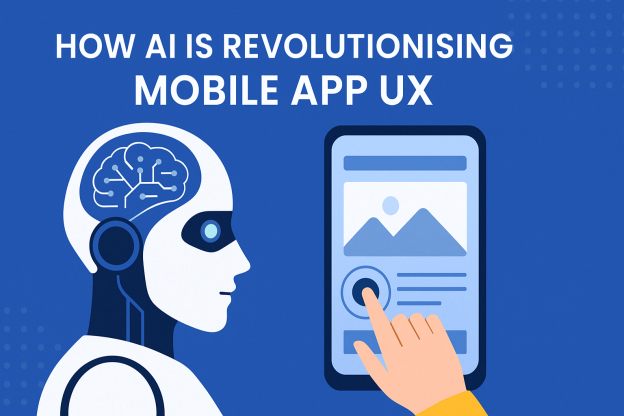How AI is Revolutionising Mobile App UX

Do you ever wonder why you get hooked on some applications and spend hours on them without realising? That’s the power of strong UX.
Elon Musk once said, “Any product that needs a manual is broken”. This is very much true in the case of mobile app designs. Today, as we progress towards advancements and new technologies, users have more awareness. Users have become adept at choosing only the good things or at least the things that feel good to them. It is true in the cases of products they buy, websites they interact with and apps they keep on their phone. Mobile apps with complex interfaces will be the least favourite for users unless they offer something users want. But how do businesses make sure that their app is appealing to all users? This is where you need to understand the power of good UX in mobile apps and websites.
An app that doesn’t feel friendly to users is not a “good app” in 2025. Earlier, it was easy to just create a simple full-fledged app that allowed users to track their orders, make payments, browse for more products, etc. But today, users want much more from an app in which they spend most of their quality time. No matter if it’s a music streaming platform, e-commerce app or a technical SaaS app, UX should be at the core of these mobile applications. Hence, developers and businesses focus on providing a seamless experience for users by creating a flexible, simple, usable and efficient app.
With AI in the picture, ensuring UX in mobile apps just became much more effective. We will explore how using AI for mobile app UX can improve the user journey a whole lot better.
What is UX?
UX refers to the user experience, encompassing various aspects of an app. UX deals with seamless interface navigation, flexible design and ease of accessibility. UX allows users to finish their task without needing any assistance.
Did you know that first impressions are significantly quick, taking approximately 50 milliseconds. Research notes that more than 90% of the impressions are based on design. User experience is one of the most important aspects for business, especially if they are an e-commerce brand. Providing a good user experience in your mobile app significantly increases the conversion rate up to 400%. It is a crucial indicator for small and medium-sized enterprises. In only 50 milliseconds, users can assess your mobile app’s visual design and create a first impression. Users may choose to continue using the app or leave without interacting based on their first impression. It is essential to capture users’ attention within a brief window of just a few milliseconds. Many companies failed to deliver an intuitive UX to customers, which shrinks the conversion rate.
A mobile app having good UX design reduces churn and removes unnecessary hurdles in the app for users. But without an effective UI, building a good UX is difficult. UI and UX combined enhance the user experience and make the application more user-friendly.
Role of AI in Mobile App User Experience (UX)
Artificial intelligence is the new future, and industries are here to embrace it. It doesn’t limit your creativity, it just makes your work easier. Without going into ‘why AI and why not AI’ in mobile apps, let’s just focus on how AI is making UX better for end users.
AI transforms user journeys, making them more intuitive and flexible. Let’s look at the various roles of AI in UX –
Finding User Insights
Tools like Adobe XD and Figma use AI-driven insights and recommendations to help designers transform the UX for users. AI examines the way customers interact with the mobile apps. Since AI works on data-intensive models, its machine learning algorithms understand user behaviour better. It simplifies the flows and interactions for designers and users alike. Designers can use AI recommendations to adjust the flows and improve the overall UX of the app.
Optimising Labour-Intensive Tasks
AI can help you effectively streamline tasks as it takes care of repetitive tasks for you. Designers can take care of more labour-intensive tasks while AI simplifies their workflows and overall UX. AI can effectively take control of tasks like resizing images.
Ensures Consistency
AI helps designers ensure consistency in app design. AI recommendations and data analysis allow designers to see where the user flows are different. It is important to provide consistency in design for all app pages. Since AI has a better idea of user behaviour, it optimises the overall user experience. AI algorithms are trained on large datasets, which can reveal user preferences, pain points and patterns, which leads to more effective and personalised designs.
App Localisation
Designers can make mobile apps more linguistically and culturally appropriate. By leveraging AI-powered translation, designers can make the mobile app more intuitive. Businesses can market linguistically appropriate apps to reach a wider audience.
Benefits of AI in UX Design
Users can benefit from AI-powered UX design in mobile apps. It brings personalisation, automation and enhanced data analysis capabilities to mobile apps for users. The primary benefits of AI in UX design include enhanced user engagement, improved productivity, data-driven decision making and smooth customer journey.
Enhanced User Engagement
Mobile apps using AI in UX design are inherently more intuitive in understanding users’ pain points and experiences. AI brings personalisation to mobile apps. The AI recommendation algorithm provides a tailored experience to users by recommending products they will resonate with. This will increase the user engagement on the app.
For instance, users are more likely to browse through pages, add the products to their cart or wishlists (which is an interaction) that enhances engagement. This leads to a higher conversion rate and boosts brand profitability. It also leads to improved customer loyalty towards the brands.
Personalisation in mobile apps is not only about dealing with showing relevant and preferred products to users. It also allows brands to show customers tailored offers and discounts that lead to the final sale.
Improved Productivity and Efficiency
Since AI takes care of low-value tasks, the process of mobile app design becomes more effective for designers. Designers can save crucial time by not engaging in repetitive tasks, which reduces manual effort. Hence, AI automation streamlines the app design process to a great extent.
Designers have a more proactive way of conducting research, developing wireframes, mid-fidelity and high-fidelity designs (final prototypes). Designers work more efficiently because AI-powered design platforms provide data-based recommendations to improve the workflow. It addresses minor discrepancies in the design process, which enhances the productivity of designers.
For example, earlier, designers spent a significant amount of time conducting market research before they dove into the design process of a mobile app. However, with AI in UX design, designers have more free time to work on complex design systems and features to embed in a mobile app.
Data Driven Decision Making
AI can process a large amount of user data, through which it recommends valuable insights to designers. AI learns about customers’ purchase patterns to predict their next steps. Based on historical purchase data of customers, AI predicts the probable products that customers might search for next.
Leveraging these insights from AI is empowering for designers as they can transform the UI/UX of the mobile app accordingly. Designers can develop in-built features for smart product recommendations in a mobile app.
Smooth Customer Journey
AI predicts user demand seamlessly by processing a large amount of data. It removes friction points in the user journey by automating tasks, predicting user needs and providing real-time recommendations to users. It helps in enhancing user retention and satisfaction.
Challenges in Implementing AI in UX Design
Keeping User-Centred Design
Artificial intelligence provides valuable insights to designers, but it is important to keep the overall design and UX of the mobile app user-centred. This means that the design process should prioritise the behaviour, experiences and needs of real users, making the entire experience meaningful and satisfying for them. Hence, it requires thorough testing and gathering user feedback throughout the design process. By doing this, designers can understand genuine problems faced by users in mobile apps and enhance their overall experience.
Considering Ethical Issues in AI
It is important to consider ethical challenges in using artificial intelligence for UX. There can be uninformed biases in the AI algorithm. There can be underlying patterns or discriminatory biases present in the AI algorithm that may perpetuate harmful stereotypes. Hence, it is important for designers to ensure that the AI algorithm is working efficiently to provide user history and preference-based personalised recommendations and not any other way around.
Maintaining Scalability with Consistency is a Challenge
Designers may find it challenging to maintain consistency in the mobile app as it scales for a larger user base. With the growing user base of the mobile app, the designers will have to scale the application to accommodate the growing users’ needs. But ensuring data accuracy, avoiding algorithm bias and maintaining personalisation in a scaled mobile application is not a piece of cake. It is especially because customer preferences and interests are always evolving. To accommodate new user needs, designers will need a more advanced and well-trained, bias-free AI model.
To Sum Up
The impact of AI on user experience is exceptional. Up until a few years ago, AI was a theory for designers and developers alike. However, by harnessing its power, developers and designers can provide well-designed, robust and scalable applications for users. AI-powered mobile apps offer engaging, efficient and personalised experiences to customers. However, it’s important to navigate the ethical challenges of AI in mobile app design. Designers should also maintain a balance between using their creativity and leveraging AI automation to complete tasks.
AI-powered mobile apps drive business growth, customer loyalty, and create personalised experiences for users. Our app developers in Boston are professionals in developing AI-powered mobile applications, having significant experience working with enterprise-level applications. You can contact our experts at VerveLogic, a leading mobile app development company in Boston, to discuss your project needs.



